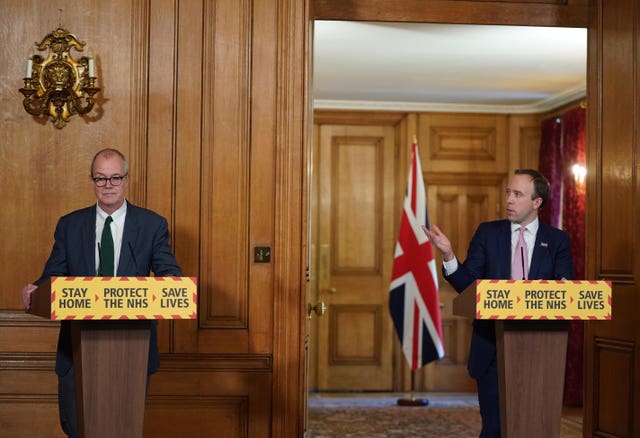
Health Secretary Matt Hancock has said he found out from a newspaper about UK chief scientific adviser Sir Patrick Vallance’s shares in a drug company contracted to develop a coronavirus vaccine for the Government.
But the Cabinet minister denied there was a conflict of interest in Sir Patrick, who leads the Government’s expert advisory panel on vaccines, reportedly holding shares worth £600,000 in pharmaceutical giant GlaxoSmithKline (GSK).
According to The Telegraph, Sir Patrick holds a deferred bonus of 43,111 shares in the British multinational outfit from his time as president of the company.
But Mr Hancock said “any suggestion” the scientific adviser was “doing anything other than his level best to try and tackle this virus” was “wrong”.
The UK now has access to six different Covid-19 vaccine candidates in development, with orders placed in July for 60 million doses from GSK and Sanofi Pasteur, subject to final contract.
The Government has also reserved up to 100 million doses of a separate vaccine being developed by Oxford University and AstraZeneca.
Mr Hancock, asked on LBC radio when he discovered the news of Sir Patrick’s personal shareholding, said: “Well, I didn’t know about it until I read it in the newspapers.”
Pushed on whether he thought he should have been informed as Health Secretary, he replied: “No, not particularly.
“I think there are rules around this and it is important he abided by the rules.”
He added: “The thing about the vaccine is actually the Oxford vaccine is being developed by AstraZeneca, which is one of GlaxoSmithKline’s biggest competitors, so I think if you know Sir Patrick Vallance as I do, any suggestion that he is doing anything other than his level best to try and tackle this virus is wrong.”

Sir Patrick this week said it was possible that small doses of vaccine could be made available before the end of the year.
In a Downing Street briefing with England’s chief medical officer Professor Chris Whitty, he said: “We don’t yet know they will work, but there is increasing evidence that is pointing in the right direction and it is possible that some vaccine could be available before the end of the year in small amounts for certain groups.”
He added that it was, however, “much more likely” that vaccines would become available “over the first half of next year”.
Speaking before further restrictions were announced across the UK, Sir Patrick on Monday warned the country could see 50,000 Covid-19 cases a day by mid-October and a daily death toll of 200 or more a month later unless urgent action was taken.
The Prime Minister last week visited the Vaccines Manufacturing Innovation Centre construction site near Oxford where the majority of the UK’s immunity medicines will be produced once the plant is completed next summer.


Why are you making commenting on The National only available to subscribers?
We know there are thousands of National readers who want to debate, argue and go back and forth in the comments section of our stories. We’ve got the most informed readers in Scotland, asking each other the big questions about the future of our country.
Unfortunately, though, these important debates are being spoiled by a vocal minority of trolls who aren’t really interested in the issues, try to derail the conversations, register under fake names, and post vile abuse.
So that’s why we’ve decided to make the ability to comment only available to our paying subscribers. That way, all the trolls who post abuse on our website will have to pay if they want to join the debate – and risk a permanent ban from the account that they subscribe with.
The conversation will go back to what it should be about – people who care passionately about the issues, but disagree constructively on what we should do about them. Let’s get that debate started!
Callum Baird, Editor of The National
Comments: Our rules
We want our comments to be a lively and valuable part of our community - a place where readers can debate and engage with the most important local issues. The ability to comment on our stories is a privilege, not a right, however, and that privilege may be withdrawn if it is abused or misused.
Please report any comments that break our rules.
Read the rules hereLast Updated:
Report this comment Cancel